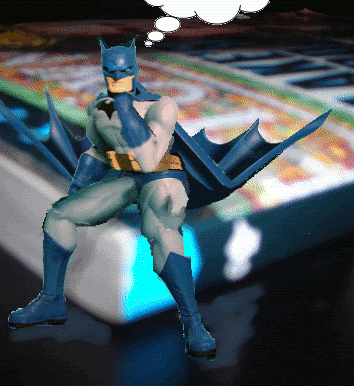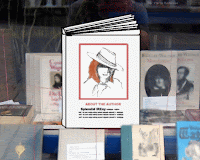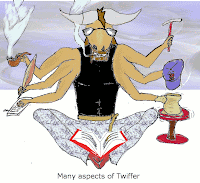Review of The Gospel According to the Simpsons by Mark I. Pinsky

I've had to look up the word "virago" at least five times. The "bright" part I get, but a virago is a horrid old monster, and when I think of Bright, I come up with (a) a person who is a far cleverer Simpsons fan than I am (I wasted a big part of my life quoting this show, but still all the good profiles in that old post were hers) and probably a cleverer person in general, (b) someone almost congenitally nice (at least in my experience--I missed all those smackdowns of the stupid that switters likes to talk about), and (c) possibly the most non-annoying believing person that I have ever met. She's got a wit that doesn't rely on vulgarity and insults (unlike some ignorant asshole book reviewers I know) which I recall hearing is a mid-western thing. Maybe she (also) figures that decency aura she has to be perplexing, but still, virago? I just can't see it.
(I liked the way this icon came out better, but thought the character might be hard to place.)
#
So with those tidbits of character, I actually sprung eleven bucks on the least likely book of this whole series so far, The Gospel According to the Simpsons. I've been exposed to a little of this sort of thing, as a young person still associated with a sort of liberal church. It was a little before the Simpsons came out, but there was other "cool" Christian literature we'd talk through in those days, looking for unceremonious expressions of faith to maybe stoke up the youth. They were something similar, but I don't remember if these books worked as badly as theological argument as Gospel does. In the opening sequence, Pinsky pretty well nails his case shut before he opens it. He brings up a scene from the series in which Homer Simpson throws up an intercessionary prayer:
"confirmation of the deal, he prays, will come in the form of 'absolutely no sign.' There is no sign." [God doesn't even mind if Homer eats the offering of cookies and milk himself] "Homer mutters the benediction, 'Thy will be done.'"The ensuing discussion calls upon the Intelligent Design authority William Dembski (even barring what I think about ID, Dembski deserves ridicule for heading a chapter with 'Recognizing the Divine Finger' without irony), along with Biblical chapter and verse to overanalyze the theological argument, while committing the worst sin of all, completely failing to get the joke. (Hint: possibly something to do with the milk.) It's not all that bad, but it's a bad opener. Pinsky himself shows ample signs of equanimity, but he's far too credulous of his experts for my tastes. Reaching back to other religious "thinkers" like Jonah ('what should dismay liberals is that so many of today's pieties are constructs of the Left') Goldberg in the conclusion really doesn't do the cause any favors. The deep Godly content is already a stretch before the dimbulb scions of the moral majority get drug out to support it.
Pinsky commits a couple other notable failures in the getting-the-joke department. In a cartoon television series, God's occasional tendency to grant wishes through prayer doesn't actually affirm any real aspect of the universe's nature. I hate to remind the guy it's fiction, although it does fill the need for so many classic storytelling motifs. Likewise, the point about Ned Flanders, who gets a whole chapter to himself as the model Evangelical, is that he is indeed a nice man, but the joke very often is that his rigid Christianity can also make him inhuman (sometimes in a positive way, but hardly always). These tidbits grate, but on the whole, the middle part of this book is surprisingly readable and enjoyable. Or maybe not surprising: Pinsky basically runs down at length the favorable approaches the show has taken to religion, and the entire middle of it is more of a report than it is an argument, often summarizing entire episodes, pointing out the religious jokes that the writers threw in. They're still funny. Most of it has to do with a run-down on the mild-mannered Protestantism the family participates in, but there's the show's token Jewish entertainer, and the Hindu character gets a chapter, as did the one episode of Buddhism. (Oddly, Pinsky didn't mention Homer's native American vision quest brought on by a Guatemalan pepper.) As they get further from the Abrahamic faiths, the writers come off a little more shallow, and the parts they right or wrong was analyzed in a shallow way, but it was not unappreciated. I can't say I've read any interviews with the writers before, and Pinsky's discussion of their backgrounds and roles writing the show was the most interesting bit of original content.
But let's point out the obvious. Although there is faith depicted in the series, The Simpsons is not about religion. The writers of the show, to their credit, have complex enough viewpoints about Christianity and other religions to offer a spectrum of positions as they suit the story or, more importantly, the humor. Most people think about projection in psychological terms, extending ones viewpoint out onto others, but when I think of projection, I usually go back to my math classes, that is, representing a complex shape in less than its complete dimensions (a projection like a map, in other words), which necessarily loses information. The Simpsons has religious and other conservative elements, and is, in fact admirable about balancing their worth, but calling the show a religious experience is reducing it. What The Simpsons does have is damn good comedy writing, and after 15 years of watching the silly program, I thank Pinsky for reminding me of that.
















